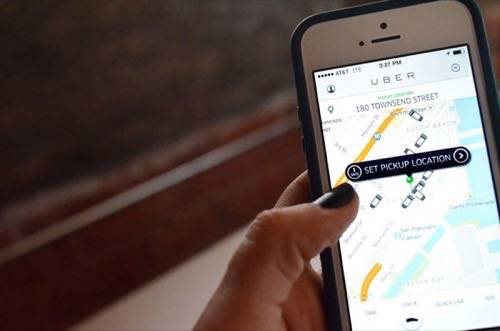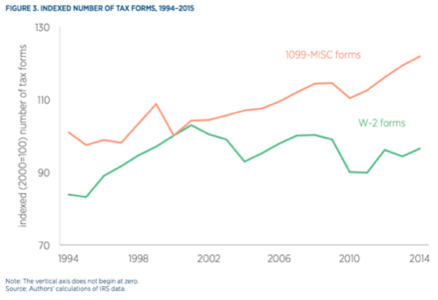
This post appears courtesy of the Ferenstein Wire, a syndicated news service. Publishing partners may edit posts. For inquiries, please email author and publisher Gregory Ferenstein.
With the rise of Uber, Airbnb, and Taskrabbit, there’s a sinking suspicion that the traditional 9-5 job is being replaced by flexible independent contract work or so-called “gigs.” But, despite multiple billion dollar Silicon Valley startups based on independent contract workers, economists have had difficulty finding any evidence that Americans were more likely to be self-employed.
“Proof of a ‘Gig Economy’ Revolution Is Hard to Find” went a recent article in The Wall Street Journal, noting that the share of self-employed workers has actually shrunk from 7.7% to 6.5% in the last decade.
But new data from George Mason’s Eli Dourado and Christopher Koopman finds that the sharing economy is, indeed, growing. “The shift toward more contract work is a real and dramatic change in the labor market,” they write.
Their data is based on the explosion of independent contractor forms (1099) issued by businesses. Since 2000, 1099s have gone up 22%, while the traditional W-2 forms have stagnated.

Previous data on the gig economy was based on survey data. But, if an Uber driver also has a part-time job on the side, they may not declare on a survey that they are “self-employed.”
The authors have a theory on why this is happening: Essentially, they believe that Silicon Valley may be taking advantage of larger changes in the economy known as “dynamism”—the rate at which jobs are created and destroyed.
“This falling dynamism, which long predates the rise of the sharing economy, presents new challenges for those seeking traditional employment,” they write. With less job openings and fewer people leaving their cushy positions, a new class of worker has turned to independent contracting.
Lack of dynamism during recessions has been especially good for companies such as Uber and Airbnb. Folks were less likely to switch jobs and fewer companies were hiring. As a result, the unemployed turned to Silicon Valley for a quick paycheck.
Should there be another recession, opportunities for the sharing economy could once again expand. Either way, this is convincing data that work appears to be the future of labor.
*For more stories like this, subscribe to the Ferenstein Wire newsletter here.
















